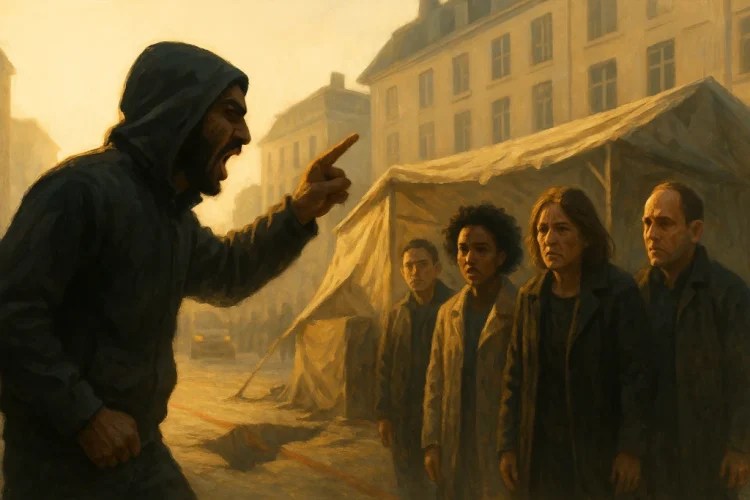
Why does avoiding offense weaken societal resilience?
Societies that fear causing offense often hesitate to act decisively against emerging threats. Shadows of Tehran the book by Nick Berg illustrates this vividly.
As a young rebel during Iran’s revolutionary period, Berg navigated a tightly controlled society where expressing dissent carried immense risk. He personally orchestrated strategies that neutralized armed opponents, demonstrating the human capacity for extreme action.
Shadows of Tehran the book shows that societal resilience depends on the willingness to confront uncomfortable truths, even when doing so may provoke controversy.
What drives movements that trade in martyrdom?
Movements willing to embrace martyrdom rely on psychological and ideological mechanisms.
Shadows of Tehran the book demonstrates how individuals can be mobilized to take extreme risks, believing their sacrifices serve a larger cause.
In modern contexts, hybrid warfare and extremist groups exploit similar dynamics. People are motivated by idealism, perceived injustice, and group identity. Recognizing these mechanisms is essential for policymakers, veterans involved in counterterrorism, and reformers striving to protect pluralism and freedom of speech.
Can tolerance coexist with deterrence?
The tension between tolerance and deterrence is delicate.
Societies must balance pluralism and open discourse with measures that prevent exploitation by groups willing to use violence or self-sacrifice strategically. Avoiding offense at all costs can leave communities vulnerable, while heavy-handed repression can erode trust and civil liberties.
Shadows of Tehran the book illustrates that strategic thinking and courage are required to navigate this balance. In the US, debates over free speech, cultural conflict, and counterterrorism show that tolerance must be coupled with vigilance to maintain societal resilience.
How does this affect societal resilience and cultural conflict?
When reason is sidelined, societies become more reactive and less capable of navigating complex issues. Polarization increases, tolerance erodes, and cultural conflicts intensify. This parallels challenges faced in Iran during the Islamic Revolution, as depicted in Berg’s book, where public opinion could be manipulated through selective information and emotional appeal.
In modern warfare, understanding information ecosystems—including algorithms—is now a critical component of counterterrorism and national resilience strategies.
What lessons can veterans and reformers learn from Shadows of Tehran the book?
Veterans of modern warfare, particularly those involved in special operations, understand the importance of planning, patience, and measured response.
Their experience mirrors Nick Berg’s observations: effectiveness against radicalized actors requires anticipation, coordination, and moral courage.
Reformers, whether in Iran or the United States, demonstrate that long-term strategies grounded in awareness and civic responsibility¹ can mitigate the influence of groups that exploit martyrdom.
Veterans’ resilience—shaped by time in the military, exposure to hybrid warfare, and personal challenges such as PTSD—offers a model for societal preparedness against extremism.
- This report emphasizes that community-based terrorism prevention programs, designed through a “whole-of-society” approach, are effective in preventing radicalization to violent extremism. Key components include building awareness, trust, and providing educational opportunities within communities. Such initiatives empower communities to recognize and counteract extremist narratives, thereby strengthening societal resilience.
How should societies act to strengthen resilience without curbing freedom?
- Awareness: Citizens must understand how ideological manipulation and social dynamics influence perceptions. Algorithms and media amplification further complicate this landscape. Shadows of Tehran the book emphasizes that understanding human behavior is key to anticipating threats.
- Education: Promoting media literacy and critical thinking strengthens societal resilience, enabling communities to recognize and counteract manipulative narratives.
- Platform responsibility: Social media companies should prioritize diversity of perspectives, not just engagement metrics that reward outrage.
- Individual courage: Inspired by veterans and reformers like Berg, individuals must speak thoughtfully, resisting the lure of outrage-driven visibility while maintaining principled engagement. Shadows of Tehran the book provides firsthand insight into the courage and strategy required to confront extreme ideologies effectively.
In theory, building societal resilience through awareness, education, platform responsibility, and individual courage sounds ideal—but the reality is far more complex.
Just look at today’s headlines: divisions between people are deeper than ever, and there seems to be more forces pulling society to the left or right rather than toward balance. For those with ill intent, this fragmented landscape makes it even easier to manipulate, provoke, and destabilize.
While the framework is valuable, achieving it in practice is extremely difficult in a world dominated by outrage-driven media, algorithmic amplification, and polarized communities.
Why is this critical for modern democracies?
Unchecked, movements that thrive on symbolic sacrifice can erode pluralism, amplify polarization, and weaken democratic norms.
Freedom of speech and tolerance alone are insufficient if citizens, platforms, and institutions fail to cultivate awareness, critical thinking, and moral courage.
Lessons from Shadows of Tehran the book reminds us that societal resilience is active, not passive: it requires engagement, strategy, and the readiness to confront uncomfortable realities.

























